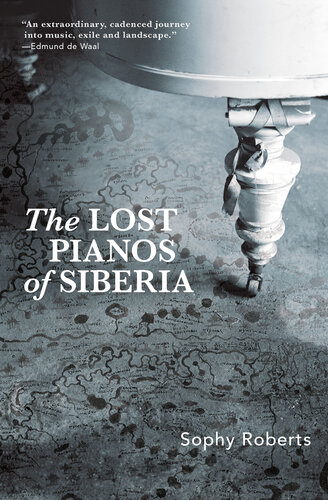
Lost Pianos of Siberia
کتاب های مرتبط
- اطلاعات
- نقد و بررسی
- دیدگاه کاربران
نقد و بررسی

March 2, 2020
In this luminous travelogue, journalist Roberts travels through Siberia looking for historically significant pianos, which she sees as symbols of civilization, refinement, and artistic freedom amid vast, frigid wildernesses and primitive settlements scarred by Russia’s bloody revolutions and barbaric gulags. Her quest also serves as a vehicle for her to investigate Siberia’s dramatic past. Episodes include mid-19th-century noblewoman Maria Volkhonsky’s journey into political exile, piano in tow, with her liberal Decembrist husband; the disappearance of a piano in the Ekaterinburg house where Bolsheviks executed Czar Nicholas II and his family; the somber picaresque of musicians and dancers incarcerated in Soviet prison camps, performing in the Arctic wastes; and the fate of a concert grand used by the Leningrad Philharmonic during its exile during WWII. The instruments often elude Roberts, but her quest sometimes achieves inspiring musical fruition, as when she arranges for a family of piano technicians in Novosibirsk to truck a resonant upright 2,000 miles to a pianist in Mongolia. The book is an eccentric meander, but Roberts’s mix of colorful history, rich reportage, and lyrical prose—“You can hear Siberia in the big, soft chords in Russian music that evoke the hush of silver birch trees and the billowing winter snows”—makes for a beguiling narrative.

April 1, 2020
A journey ignited by a search to bring a piano to Mongolia, this work is history mixed with travelog. Journalist Roberts travels across Siberia, mainly near the trans-Siberian railway, though she also explores isolated towns that contribute to an intimate portrait of a part of the world that has long held the public imagination, though is little understood, and even less visited. Aside from some setbacks, including being detained by border guards, Roberts tracks down numerous pianos, both Russian and foreign-made, and ties the pianos, and Siberia, to Russia's history from Tsarist times, through the overthrow of the Romanov's, the USSR, to the present day with the Gulag, the prison camps synonymous with Siberia, playing a central role throughout. The approach each government took toward music provides valuable context on the culture of each era. A background in music or pianos may enhance the journey, though the nonmusical reader will not be intimated or overwhelmed. VERDICT Tigers, pianos, prisoners, and historical perspective throughout Siberia's past and present are the heart of this personal account that starts and ends with the search for a piano. While the pianos and their providence are captivating, the history and people stand out.--Zebulin Evelhoch, Deschutes P.L., OR
Copyright 2020 Library Journal, LLC Used with permission.

April 1, 2020
Across the vast expanse of Siberia, pianos brought culture and consolation. British journalist Roberts makes an engaging book debut with a chronicle of her travels through Siberia searching for pianos. Guided by a history of 19th-century Russian piano makers, the author was aware of the proliferation and distribution of pianos, some manufactured by Western companies, far from Russia's major cities. By the end of the 19th century, one workshop in St. Petersburg alone had built more than 11,000 pianos, many of which were hauled by sledge to outposts in Siberia. "East of the Urals," Roberts writes, "music teachers were paid two to three times the amount they earned in Western Russia. In these new towns of the expanding Empire, the piano played an even more important social role than it did in a Moscow drawing room." In the town of Tomsk, for example, a place Chekhov found boring, a chapter of the Imperial Russian Music Society incited a flourishing musical culture. Its grand piano was chosen by the brother of famed pianist Anton Rubinstein. Besides forming the center of cultural life for residents who settled in Siberia hoping for fortune, freedom, or a new beginning, pianos were crucial to the region's many penal colonies, where classical music elicited "a keen sense of European identity and pride." In Kolyma, near the Sea of Okhotsk, Roberts recalls the "political dissidents, hardened criminals, recidivist killers, invalids half dead with dystrophy, poets, pianists, and starving women" brought by Stalin's gulag ships. Even in that harsh colony, there was a grand piano, housed in a building constructed by prisoners. Roberts describes vividly the "bald, scarred, austere" landscapes that make up much of Siberia as well as the often eccentric individuals--many of them piano tuners--who assisted in her quest. Aiming "to celebrate all that is magnificent about Siberia," Roberts realized that often the pianos she found were "tied up with a terrifying past." An absorbing history illuminates a bleak landscape. (b/w illustrations; maps)
COPYRIGHT(2020) Kirkus Reviews, ALL RIGHTS RESERVED.

May 15, 2020
The origins of this title's lost pianos start with the mass manufacture of the instruments in Russia beginning in the mid-nineteenth century. Their production was inspired, English travel writer Roberts writes, by a national fever dream over the arrival?more pointedly, the playing?of Franz Liszt in St. Petersburg in 1842. With the banishment of millions of Russians over the decades to tsarist prisons, later gulags, in the unimaginably vast Siberian expanse, the pianos followed, establishing cultural beachheads that Roberts seeks out here in digressive, hopscotch fashion, with a passion bordering on obsessive. She finds herself in the Urals, in Ekaterinburg looking for the last piano the Romanovs, all of them executed there, ever played; and in an abandoned penal colony in far-eastern Sakhalin Island, where a prisoner's wife, a former student of the great Anton Rubinstein, was forced to play for local officials. Roberts has a splendid eye for detail, whether in the history and flavor of the cities and regions she visits or in the living, breathing people she encounters on this almost otherworldy journey.(Reprinted with permission of Booklist, copyright 2020, American Library Association.)

























دیدگاه کاربران